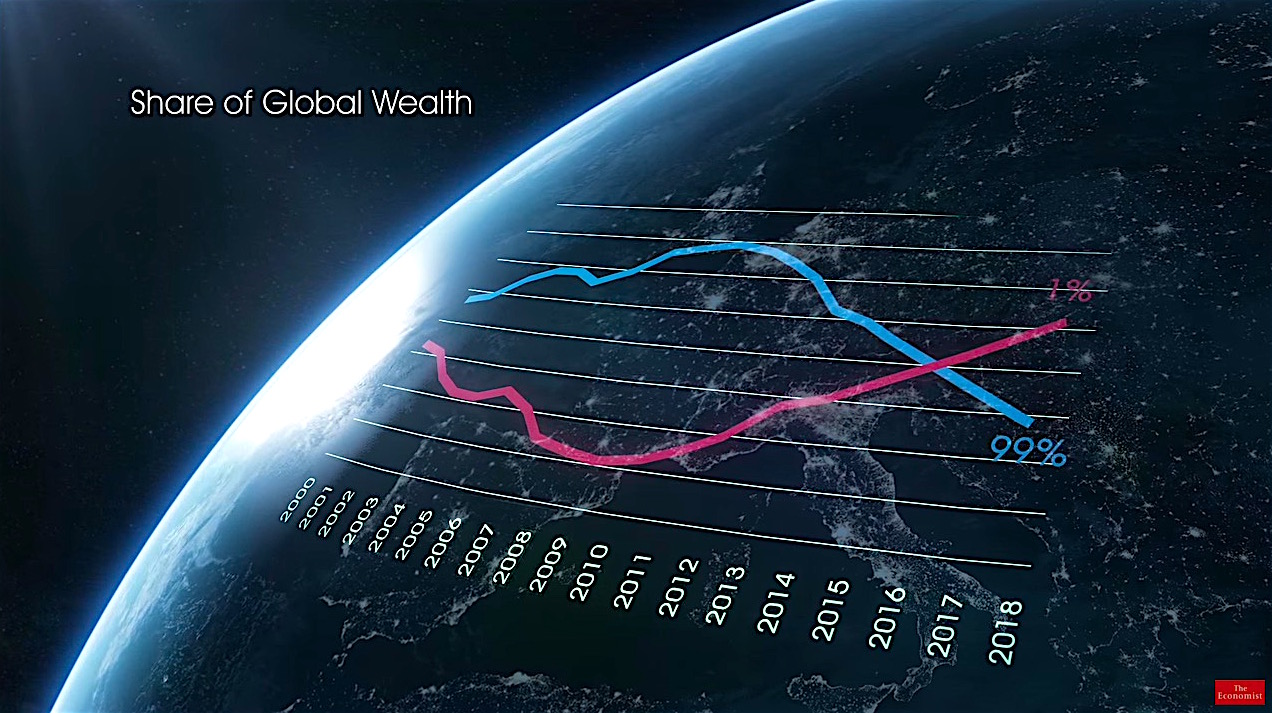Economists, even conservative ones, are fretting over wealth inequality at annual U.S. meeting


A free daily email with the biggest news stories of the day – and the best features from TheWeek.com
You are now subscribed
Your newsletter sign-up was successful
In 2016, The Economist says in this short video, the richest 1 percent of the world's population will, for the first time, have a larger share of global wealth than the other 99 percent.
Wealth and income inequality used to be a topic that concerned mostly leftist and Marxist economists, but this week it is perhaps the major topic of discussion and research at the American Economic Association's annual meeting in San Francisco, The New York Times reports. And the top 1 percent of the wealth isn't even the real story; the biggest gains in wealth have been among the top 0.25 percent of earners, roughly 250,000 people whose income has ballooned in recent decades while the typical American worker is earning roughly the same.
The economists disagree over the consequences and policy prescriptions for the growing wealth chasm, but "this is a truly global phenomenon, and I don’t know any serious economist who would deny inequality has gone up," says Nicholas A. Bloom, a Stanford economics professor. "The debate is over the magnitude, not the direction."
The Week
Escape your echo chamber. Get the facts behind the news, plus analysis from multiple perspectives.

Sign up for The Week's Free Newsletters
From our morning news briefing to a weekly Good News Newsletter, get the best of The Week delivered directly to your inbox.
From our morning news briefing to a weekly Good News Newsletter, get the best of The Week delivered directly to your inbox.
The Times focus on a paper Bloom is writing with four other economists which shows that the top quarter of 1 percent of Americans — those earning $640,000 or more a year — have seen their salaries double from 1981 to 2013, even accounting for inflation, but that the pay of the highest-paid employees at large, successful companies has gone up 140 percent while the wages of the typical employee at these corporate juggernauts have fallen 5 percent. "There's no reason the free market will solve this," says Bloom, whom The Times describes as "a native of Britain whose politics veer toward a laissez-faire approach and the Conservative Party there." You can read more about Bloom's research and the annual AEA meeting at The New York Times.
A free daily email with the biggest news stories of the day – and the best features from TheWeek.com
Peter has worked as a news and culture writer and editor at The Week since the site's launch in 2008. He covers politics, world affairs, religion and cultural currents. His journalism career began as a copy editor at a financial newswire and has included editorial positions at The New York Times Magazine, Facts on File, and Oregon State University.
-
 The ‘ravenous’ demand for Cornish minerals
The ‘ravenous’ demand for Cornish mineralsUnder the Radar Growing need for critical minerals to power tech has intensified ‘appetite’ for lithium, which could be a ‘huge boon’ for local economy
-
 Why are election experts taking Trump’s midterm threats seriously?
Why are election experts taking Trump’s midterm threats seriously?IN THE SPOTLIGHT As the president muses about polling place deployments and a centralized electoral system aimed at one-party control, lawmakers are taking this administration at its word
-
 ‘Restaurateurs have become millionaires’
‘Restaurateurs have become millionaires’Instant Opinion Opinion, comment and editorials of the day
-
 TikTok secures deal to remain in US
TikTok secures deal to remain in USSpeed Read ByteDance will form a US version of the popular video-sharing platform
-
 Unemployment rate ticks up amid fall job losses
Unemployment rate ticks up amid fall job lossesSpeed Read Data released by the Commerce Department indicates ‘one of the weakest American labor markets in years’
-
 US mints final penny after 232-year run
US mints final penny after 232-year runSpeed Read Production of the one-cent coin has ended
-
 Warner Bros. explores sale amid Paramount bids
Warner Bros. explores sale amid Paramount bidsSpeed Read The media giant, home to HBO and DC Studios, has received interest from multiple buying parties
-
 Gold tops $4K per ounce, signaling financial unease
Gold tops $4K per ounce, signaling financial uneaseSpeed Read Investors are worried about President Donald Trump’s trade war
-
 Electronic Arts to go private in record $55B deal
Electronic Arts to go private in record $55B dealspeed read The video game giant is behind ‘The Sims’ and ‘Madden NFL’
-
 New York court tosses Trump's $500M fraud fine
New York court tosses Trump's $500M fraud fineSpeed Read A divided appeals court threw out a hefty penalty against President Trump for fraudulently inflating his wealth
-
 Trump said to seek government stake in Intel
Trump said to seek government stake in IntelSpeed Read The president and Intel CEO Lip-Bu Tan reportedly discussed the proposal at a recent meeting
